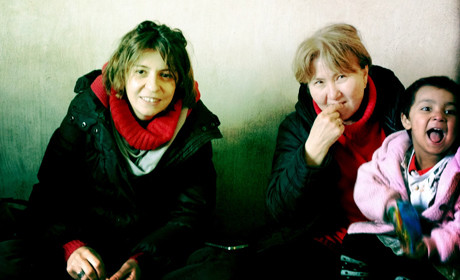
Natalia Antelava and Bakhora Tadjibaeva in a room on the Uzbek and Kazakh border
Credit: Image courtesy of Natalia AntelavaThis week a radio documentary on allegations of the forced sterilisation of women in Uzbekistan won the Foreign Press Association award in the radio category.
BBC correspondent Natalia Antelava, who is currently based in Delhi, used an iPhone and also Skype to record the interviews and has not used a microphone and Marantz, the audio recorder usually used by the BBC, since.
The award-winning documentary, produced by Wesley Stephenson in London, was aired on Radio 4's Crossing Continents and the BBC World Service Assignment programme, with the iPhone and Skype providing broadcast-quality interviews.
Journalism.co.uk spoke to Antelava to find out why a mobile phone can be less intrusive than an audio recorder and microphone.
Antelava, who has previously been based in Central Asia and later in Beirut, knew that she would not get permission to gather interviews in Uzbekistan.
"We knew we couldn't record openly because the BBC is banned from operating there in what is generally a very repressive state that does not welcome journalists."
Another problem was the sensitive nature of the investigation and the fear that people have in speaking openly.
In a country where people are terrified of speaking not just to journalists, to their neighbours and their family members, doing a programme like that came with a whole load of problems and that's why, having considered very carefully the options for recording, we decided the mobile phone was the way to go."The mobile phone is so much part of everybody's life now that people just don't seem to be intimidated or pay much attention to it at allNatalia Antelava
Antelava added that she knew it would be very difficult to bring radio equipment into the country, and that "a microphone would put people we interviewed at great risk and I would put myself at risk of deportation".
"From the very beginning we decided that we would try to record on a mobile phone and looked at quite a few options, and then finally settled on an iPhone."
But despite all the planning, Antelava was not permitted to enter the country.
"I was held and questioned at the airport and then 24 hours later deported."
The iPhone "proved a fantastic asset", Antelava said as she recorded the entire deportation using the smartphone, including it in the documentary.
Antelava "tried to rescue the story" by going to the border of Uzbekistan and Kazakhstan. She went with the BBC's Bakhora Tadjibaeva, who is normally based in Almaty, Kazakhstan.
She is the office manager there and "came along to help me out and was absolutely critical to the whole operation", Antelava added.
Antelava and Tadjibaeva "parked" themselves on the Kazakh side of the border for a fortnight and spent the time "just hanging out with the women" who had come across from Uzbekistan.
"It took a really long time to get them to talk," Antelava explained.
Antelava also did several interviews on Skype with people inside the country, and the pair also managed to arrange for some people to come across from Uzbekistan to be interviewed.
"It was quite an operation," she explained.
Because of Uzbek security "it was really handy to be unnoticeable and not to be walking around with a big microphone and a Marantz".
Asked if interviewees responded differently because she was using a phone rather than a microphone, Antelava said that they did.
"I've always been envious of print reporters who don't have to stick a microphone into the faces of their interviewees. The mobile phone is so much part of everybody's life now that people just don't seem to be intimidated or pay much attention to it at all. It was much, much easier."
Antelava used an iPhone 4S which she found to "be really good at picking up ambient sound".
"I would just sit in a room and keep it running for sound and no one would pay much attention to me or pay much attention to the fact that I was recording anything."
She used the paid version of the Audio Memos app. "It records in wav and it provides an easier transfer to computer," she explained. "Having tried a few apps, that was the one that I used."
And the iPhone has now become her default reporting kit.
"It's been almost a year since I did the documentary and I haven't used a Marantz since."
The full list of winners of the Foreign Press Association awards 2012 is at this link.
In the BBC's report its adds that Uzbek officials said in a statement that the allegations "bore no relation to reality".
Free daily newsletter
If you like our news and feature articles, you can sign up to receive our free daily (Mon-Fri) email newsletter (mobile friendly).
Related articles
- Gear, apps and workflows: Rob Layton's complete mobile journalism checklist
- Five free AI-powered transcription tools for journalists
- New project InOldNews wants to improve representation in video journalism
- 38 mojo apps from BBC trainer Marc Blank-Settle
- 15 online communities for journalists you should know about











